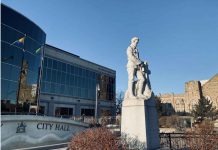
From the Black Death to the Spanish Flu, history teaches that social tension accumulated over an epidemic can lead to significant episodes of rebellion, according to a study by Massimo Morelli and Roberto Censolo
THUNDER BAY – There have been several instances of social unrest globally over the past months. From protests like Black Lives Matter to anti-mask protests, there are many people who are upset right now.
If you have not been hearing much of the French Gilets Jaunes or of the Italian Sardines in the last few months, it’s because “the social and psychological unrest arising from the epidemic tends to crowd-out the conflicts of the pre-epidemic period, but, at the same time it constitutes the fertile ground on which global protest may return more aggressively once the epidemic is over,” writes Massimo Morelli, Professor of Political Science at Bocconi, in a paper recently published in Peace Economics, Peace Science and Public Policy.
Professor Morelli and Roberto Censolo (University of Ferrara) argue that we can get an informed opinion about the possible effects of COVID-19 on protest and future social unrest by looking at the great plagues of the past, so they analyze 57 epidemic episodes between the Black Death (1346-1353) and the Spanish Flu (1919-1920). They state that while the epidemic lasts the status quo and incumbent governments tend to consolidate, but warn that a sharp increase in social instability in the aftermath of the epidemic should be expected.
Revolts not evidently connected with the disease are infrequent within an epidemic period, but epidemics can sow other seeds of conflict. Government conspiracy, “the filth of the poor”, foreigners and immigrants have often been singled out as the cause of an epidemic. “Overall, the historical evidence shows that the epidemics display a potential disarranging effect on civil society along three dimensions,” the authors write. “First, the policy measures tend to conflict with the interest of people, generating dangerous friction between society and institutions.
Second, to the extent that an epidemic impacts differently on society in terms of mortality and economic welfare, it may exacerbate inequality. Third, the psychological shock can induce irrational narratives on the causes and the spread of the disease, which may result in social or racial discrimination and even xenophobia.” Focusing on five cholera epidemics, Morelli and Censolo count 39 rebellions in the 10 years preceding an epidemic and 71 rebellions in the 10 years following it.
On the other hand, the authors note that, in the short-term, the necessary restrictions of freedom during an epidemic may be strategically exploited by governments to reinforce power.





